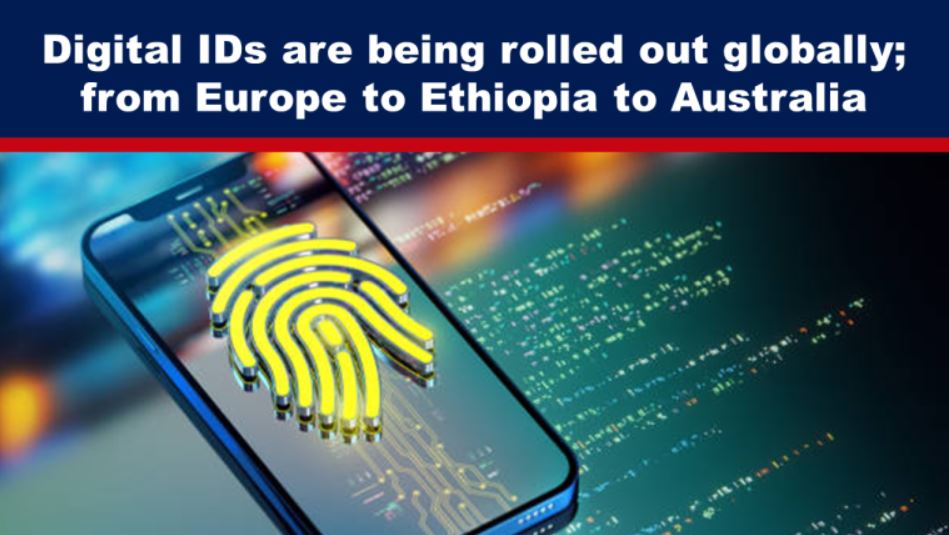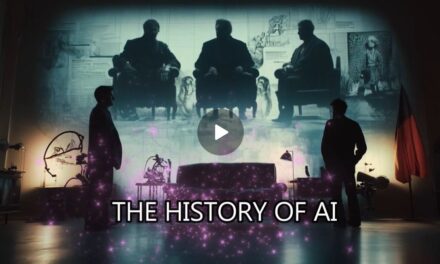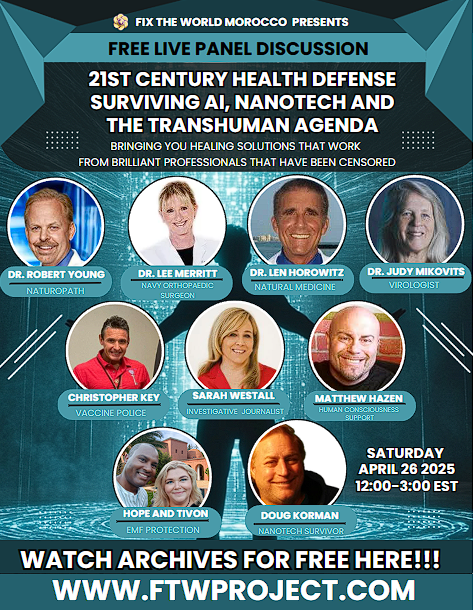Here is a collection of news items and social media posts from the last week relating to the rollout of digital identities in various countries. But first, a brief look at who is behind the push to be able to digitally identify every person on Earth.
1. Bill Gates’ Inclusive Financial Systems: Gates’ goal is to expand access to his digital financial services to people in the lowest-income communities around the globe.
“We work with our partners to support public and private investment in digital payment infrastructure, new regulatory standards, and gender equality initiatives such as digitised government benefit payments, to ensure continued progress toward the promise of financial inclusion,” the Bill & Melinda Gates Foundation webpage for its Inclusive Financial Systems states.
2. ‘Digital IDs are an effective tool against poverty’: This is the deceptive title of an article, one of the updates for Gates’ Inclusive Financial Systems mentioned above, published by the Bill & Melinda Gates Foundation.
“Digital ID systems are one of the three pillars of what’s known as digital public infrastructure (DPI); the others are digital payment systems and data exchange systems,” the article stated.
Further reading: Western taxpayers are funding the global rollout of the controligarchs’ surveillance and control system, The Exposé
The article goes on to note that Gates is offering his Modular Open Source Identity Platform (“MOSIP”) to all countries so they can build their own national identity systems for free. For free? Really? Nothing is for free. Just because Gates is not asking for money upfront, it does not mean that he is not taking something in return.
“The original inspiration for MOSIP was India’s national digital ID system, Aadhaar, which launched in 2009. This ambitious effort would eventually enrol over 99% of all Indian adults,” the Bill and Melinda Gates Foundation said.
Further reading: Bill Gates is “inspired” by digital ID and smart farming projects in India, The Exposé
Bill Gates: India’s “digital public infrastructure”, which combines biometric digital ID, digital payments and massive data sharing—spanning across the fields of agriculture, education and healthcare, among others—will take on a whole new dimension with the introduction of AI.… pic.twitter.com/dCDxUxT8RT
— Wide Awake Media (@wideawake_media) April 4, 2024
3. Philippines experts weigh in on leveraging fintech, blockchain solutions: With insights from industry leaders, the discourse on ‘Rebuilding Trust in the New Global Digital Economy and Digital Identity’ highlighted how blockchain offers secure, transparent, and efficient avenues for global trade and financial inclusion.
Andrew Chung, Executive Director and Chief Technology Officer of TradeLink, emphasised the need to establish a universal mechanism for digital identity in cross-border transactions. He highlighted the significance of leveraging electronic passports and digital certificates to authenticate people globally.
“We need to find a solution that can be used, no matter where you are, as long as you are wanting to do business with your friends from the Philippines, people in Hong Kong, or other countries,” Chung said.
4. National Digital IDs for refugees in Ethiopia: The Government of Ethiopia, through its Refugees and Returnees Service (“RRS”) in partnership with the National ID Program (“NIDP”) and the UN Refugees Agency (“UNHCR”) launched an initiative to include refugees and asylum seekers into the Ethiopian Digital ID system.
The cards, which contain a unique identification number dubbed Fayda, are intended to enable this category of persons to get access to important social services, according to an announcement by the UNHCR.
5. Digital wallet use in Greece: During March, 105,237 Greek citizens downloaded the Gov.gr Wallet application on their mobile phones. The number of Greeks who have downloaded the digital wallet since its launch in July 2022 is estimated at 1,877,032. The government recently expanded the application’s use making it mandatory for entrance in stadiums as of 9 April.
The Gov.gr Wallet allows a person to create, store and control their digital documents. Digital ID cards, digital driving licenses, digital disability cards, DYPA digital cards and digital cards are already supported.
The new digital ID card, digital driver’s license, digital disability card, the DYPA digital card and the digital ring card are digital documents issued through Gov.gr and are fully equal to the paper documents. They are not international travel documents.
6. Digital ID at centre of Europe’s data sharing changes: The European Digital Identity (“EUDI”) Wallet inches closer to reality.
The Centre of Excellence for Data Sharing and Cloud (CoE DSC), an international initiative for data sharing based in the Netherlands, has published a guide on what the European digital identity will mean for data spaces, including service providers and data sharing initiatives.
Common European data spaces are the continent’s attempt to create a single market for data, ensuring that more data becomes available for use in the economy, society and research.
“Digital Identity (DI) is a key building block for data spaces,” the paper notes.
Data spaces are set to benefit from the EU-wide digital identity which will enable cross-sectoral data sharing and interoperability.
The Centre of Excellence for Data Sharing and Cloud provides an analysis of the upcoming eIDAS 2.0 regulation, which aims to introduce new trust services and regulate the EUDI Wallet for natural persons and the “Organisational Digital Identity Wallet” (ODIW) for legal entities.
7. Australia Digital Identity Bill: Tweeting a video yesterday, Russell Broadbent, member of the House of Representatives for Monash, said: I’ve had a gut full of being told what I can and can’t do, say and think. Now, Australia is fast heading toward a ‘Digital Prison’ where everything will be known about you, leading to dangerous and unprecedented levels of control over your life. Speak up while you still can!”
In his video, he said: ”Just before Easter the Senate rammed through the Digital Identity Bill. No debate, no consultation and no respect for the Australian people or the Parliament … If the past four years have taught me anything, it’s that our government and governments across the world are increasingly using tyrannical tactics to achieve their goals of increased control over every aspect of our lives.”
8. Hacker publishes data of almost the entire population of El Salvador: On 6 April, a hacker decided to make the personal information of 5.1 million Salvadorans available for free on the dark web: names, dates of birth, phone numbers, residential addresses, email addresses, and unique identity numbers (Documento Único de Identidad or DUI) numbers. The file includes millions of high-definition photos of Salvadoran citizens. The breach affects the majority of adults in the country.
It has not yet been confirmed whether the stolen data comes from registrations on the Chivo wallet app, the government’s electronic wallet introduced with the Bitcoin Law on 7 September 2021 to maintain both Bitcoin and US dollars. However, the suspicion is quite concrete, considering that the leaked information matches the data required for registration on the wallet.
9. A reminder of where it all began: Covid vaccine passports were the precursor to digital IDs as demonstrated in China.
Digital IDs are electronic shackles to keep people in lines. https://t.co/9MIwp7CWz0
— Songpinganq (@songpinganq) April 7, 2024
Source: https://expose-news.com/2024/04/11/digital-ids-are-being-rolled-out-globally/
Bitchute: https://www.bitchute.com/channel/YBM3rvf5ydDM/
Telegram: https://t.me/Hopegirl587
EMF Protection Products: www.ftwproject.com
QEG Clean Energy Academy: www.cleanenergyacademy.com
Forbidden Tech Book: www.forbiddentech.website













